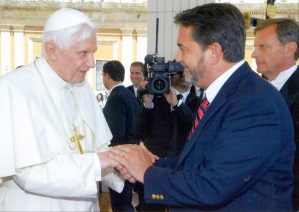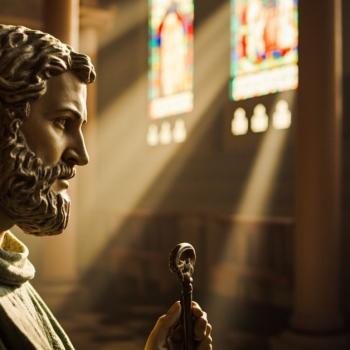
*****
All blue-colored emphases are added.
* * * * *
Anti-Catholic Protestant Sophist-blogger Steve Hays wrote on 2-19-06 and 6-29-06:
Thanks, Dave, for usurping the role of the Catholic bishops. The bishops are the shepherds of the flock, not a lowly layman. Dear old Dave really can’t get over being Protestant at heart. He really can’t leave it to the Magisterium to get the job done. Instead, we have this self-anointed shepherd of the Catholic flock. Thanks, Dave, for reminding us of how little faith you have in the hierarchy. Thanks for taking it upon yourself to out-Pope the Pope.
* * *
Yes, the papacy encourages a lay apostolate the way a principal encourages student government. Just as student government gives a gullible junior high or high school student the illusion that he has a real say in the process, papal encouragement of the laity gives them the illusion that a layman has a real say in the process.
The policy-makers learned along time ago that the best way to avert a grassroots insurrection is to give a gabby member of the hoi polloi his own office — preferably a windowless room in the subbasement — with his own name on the door, his own letterhead, and a fancy title; then steer a lot of busywork his way — like polishing the brass plaque with his name on the door, sharpening departmental pencils, and filing departmental memos on interdepartmental pencil-sharpening protocols.
***
This makes more evident the role given to the laity in catechesis today . . . We must be grateful to the Lord for this contribution by the laity, . . . lay catechists must be carefully prepared for what is, if not a formally instituted ministry, at the very least a function of great importance in the Church. (Pope St. John Paul II, 1979 – see below)
Lay people also play their part by consecrating the world to God, and many of them are coming to a deeper sense of their indispensable role in the Church’s evangelizing mission. . . . lay people can and must be a true leaven in every corner of society in Oceania. Upon this, the success of the new evangelization depends in large part . . . There is a need too for a new apologetics in keeping with the words of Saint Peter: “Be ready to give reasons for your hope” (1 Pt 3:15). In this way, the faithful will be more confident in their Catholic faith and less susceptible to the allure of these groups and movements, . . . (Pope St. John Paul II, 2001 – see below)
[T]his sacred synod earnestly exhorts laymen – each according to his own gifts of intelligence and learning — to be more diligent in doing what they can to explain, defend, and properly apply Christian principles to the problems of our era in accordance with the mind of the Church. (Blessed Pope Paul VI, 1965 – see below)
***
Pope St. John Paul II
Apostolic Exhortation Catechesi Tradendae (“On Catechesis In Our Time”)
16 October 1979
18. . . . All in all, it can be taken here that catechesis is an education of children, young people and adults in the faith, which includes especially the teaching of Christian doctrine imparted, generally speaking, in an organic and systematic way, with a view to initiating the hearers into the fullness of Christian life. Accordingly, while not being formally identified with them, catechesis is built on a certain number of elements of the Church’s pastoral mission that have a catechetical aspect, that prepare for catechesis, or that spring from it. These elements are: the initial proclamation of the Gospel or missionary preaching through the kerygma to arouse faith, apologetics or examination of the reasons for belief, experience of Christian living, celebration of the sacraments, integration into the ecclesial community, and apostolic and missionary witness.
[ . . . ]
Lay Catechists
66. I am anxious to give thanks in the Church’s name to all of you, lay teachers of catechesis in the parishes, the men and the still more numerous women throughout the world who are devoting yourselves to the religious education of many generations. Your work is often lowly and hidden but it is carried out with ardent and generous zeal, and it is an eminent form of the lay apostolate, a form that is particularly important where for various reasons children and young people do not receive suitable religious training in the home. How many of us have received from people like you our first notions of catechism and our preparation for the sacrament of Penance, for our first Communion and Confirmation! The fourth general assembly of the synod did not forget you. I join with it in encouraging you to continue your collaboration for the life of the Church.
But the term “catechists” belongs above all to the catechists in mission lands. Born of families that are already Christian or converted at some time to Christianity and instructed by missionaries or by another catechist, they then consecrate their lives, year after year, to catechizing children and adults in their own country. Churches that are flourishing today would not have been built up without them. I rejoice at the efforts made by the Sacred Congregation for the Evangelization of Peoples to improve more and more the training of these catechists. I gratefully recall the memory of those whom the Lord has already called to Himself. I beg the intercession of those whom my predecessors have raised to the glory of the altars. I wholeheartedly encourage those engaged in the work. I express the wish that many others may succeed them and that they may increase in numbers for a task so necessary for the missions.
. . . 67. . . . That is why every big parish or every group of parishes with small numbers has the serious duty to train people completely dedicated to providing catechetical leadership (priests, men and women religious, and lay people), to provide the equipment needed for catechesis under all aspects, to increase and adapt the places for catechesis to the extent that it is possible and useful to do so, and to be watchful about the quality of the religious formation of the various groups and their integration into the ecclesial community.
[ . . . ]
70. Lastly, encouragement must be given to the lay associations, movements and groups, whether their aim is the practice of piety, the direct apostolate, charity and relief work, or a Christian presence in temporal matters. They will all accomplish their objectives better, and serve the Church better, if they give an important place in their internal organization and their method of action to the serious religious training of their members. In this way every association of the faithful in the Church has by definition the duty to educate in the faith.
This makes more evident the role given to the laity in catechesis today, always under the pastoral direction of their Bishops, as the propositions left by the synod stressed several times.
71. We must be grateful to the Lord for this contribution by the laity, but it is also a challenge to our responsibility as pastors, since these lay catechists must be carefully prepared for what is, if not a formally instituted ministry, at the very least a function of great importance in the Church. Their preparation calls on us to organize special centers and institutes, which are to be given assiduous attention by the Bishops. This is a field in which diocesan, interdiocesan or national cooperation proves fertile and fruitful. Here also the material aid provided by the richer Churches to their poor sisters can show the greatest effectiveness, for what better assistance can one Church give to another than to help it to grow as a Church with its own strength?
Pope St. John Paul II
Post-Synodal Apostolic Exhortation Ecclesia in Oceania
22 November 2001
19. . . . With the Bishops, all Christ’s faithful – clergy, religious, and laity – are called to proclaim the Gospel . . . Lay people also play their part by consecrating the world to God, and many of them are coming to a deeper sense of their indispensable role in the Church’s evangelizing mission. (69) Through the witness of love in the Sacrament of Matrimony or the generous dedication of people called to the single life, through their activity in the world whatever it might be, lay people can and must be a true leaven in every corner of society in Oceania. Upon this, the success of the new evangelization depends in large part.
[ . . . ]
Fundamentalist Groups
24. Ecumenism needs to be distinguished from the Church’s approach to fundamentalist religious groups and movements, some of which are Christian in inspiration. In some missionary areas, the Bishops are concerned about the effect that these religious groups or sects are having on the Catholic community. Some groups base their ideas on a reading of Scripture, often employing apocalyptic images, threats of a dark future for the world, and promises of economic rewards for their followers. While certain of these groups are openly hostile to the Church, others wish to engage in dialogue. In more developed and secularized societies, concern is growing about fundamentalist Christian groups which draw young people away from the Church, and even from their families. Many different movements offer some form of spirituality as a supposed remedy for the harmful effects of an alienating technological culture in which people often feel powerless. The presence and activity of these groups and movements are a challenge to the Church to revitalize her pastoral outreach, and in particular to be more welcoming to young people and to those in grave spiritual or material need. (89) It is also a situation which calls for better biblical and sacramental catechesis and an appropriate spiritual and liturgical formation. There is a need too for a new apologetics in keeping with the words of Saint Peter: “Be ready to give reasons for your hope” (1 Pt 3:15). In this way, the faithful will be more confident in their Catholic faith and less susceptible to the allure of these groups and movements, which often deliver the very opposite of what they promise.
Blessed Pope Paul VI
Decree on the Apostolate of the Laity (Apostolicam Actuositatem)
18 November 1965
1. To intensify the apostolic activity of the people of God,(1) the most holy synod earnestly addresses itself to the laity, whose proper and indispensable role in the mission of the Church has already been dealt with in other documents.(2) The apostolate of the laity derives from their Christian vocation and the Church can never be without it. Sacred Scripture clearly shows how spontaneous and fruitful such activity was at the very beginning of the Church (cf. Acts 11:19-21; 18:26; Rom. 16:1-16; Phil. 4:3).
Our own times require of the laity no less zeal: in fact, modern conditions demand that their apostolate be broadened and intensified. With a constantly increasing population, continual progress in science and technology, and closer interpersonal relationships, the areas for the lay apostolate have been immensely widened particularly in fields that have been for the most part open to the laity alone. These factors have also occasioned new problems which demand their expert attention and study. This apostolate becomes more imperative in view of the fact that many areas of human life have become increasingly autonomous. This is as it should be, but it sometimes involves a degree of departure from the ethical and religious order and a serious danger to Christian life. Besides, in many places where priests are very few or, in some instances, deprived of due freedom for priestly work, the Church could scarcely exist and function without the activity of the laity.
An indication of this manifold and pressing need is the unmistakable work being done today by the Holy Spirit in making the laity ever more conscious of their own responsibility and encouraging them to serve Christ and the Church in all circumstances.(3)
In this decree the Council seeks to describe the nature, character, and diversity of the lay apostolate, to state its basic principles, and to give pastoral directives for its more effective exercise. All these should be regarded as norms when the canon law, as it pertains to the lay apostolate, is revised.
[2. cf. Second Vatican Council, Dogmatic Constitution on the Nature of the Church, nos. 33 ff.: A.A.S. 57 (1965) pp. 39 ff.; cf; also Constitution on the Liturgy, nos. 26-40; A.A.S. 56 (1964) pp. 107- 111; cf. Decree on Instruments of Social Communication: A.A.S. 56 (1964) pp. 145-158; cf. Decree on Ecumenism: A.A.S. 57 (1965) pp. 90-107; cf. Decree on Pastoral Duties of Bishops, nos. 16, 17, 18; cf. Declaration on Christian Education, nos. 3, 5, 7; cf. Decree on Missionary Activity of Church, nos. 15, 21, 41; cf. Decree on Priestly Life and Ministry, no. 9.]
2. . . . In the Church there is a diversity of ministry but a oneness of mission. Christ conferred on the Apostles and their successors the duty of teaching, sanctifying, and ruling in His name and power. But the laity likewise share in the priestly, prophetic, and royal office of Christ and therefore have their own share in the mission of the whole people of God in the Church and in the world.(2)
They exercise the apostolate in fact by their activity directed to the evangelization and sanctification of men and to the penetrating and perfecting of the temporal order through the spirit of the Gospel. In this way, their temporal activity openly bears witness to Christ and promotes the salvation of men. Since the laity, in accordance with their state of life, live in the midst of the world and its concerns, they are called by God to exercise their apostolate in the world like leaven, with the ardor of the spirit of Christ.
3. The laity derive the right and duty to the apostolate from their union with Christ the head; incorporated into Christ’s Mystical Body through Baptism and strengthened by the power of the Holy Spirit through Confirmation, they are assigned to the apostolate by the Lord Himself. They are consecrated for the royal priesthood and the holy people (cf. 1 Peter 2:4-10) not only that they may offer spiritual sacrifices in everything they do but also that they may witness to Christ throughout the world. The sacraments, however, especially the most holy Eucharist, communicate and nourish that charity which is the soul of the entire apostolate.(3)
[ . . . ]
5. . . . There are innumerable opportunities open to the laity for the exercise of their apostolate of evangelization and sanctification.
[ . . . ]
6. . . . Since, in our own times, new problems are arising and very serious errors are circulating which tend to undermine the foundations of religion, the moral order, and human society itself, this sacred synod earnestly exhorts laymen-each according to his own gifts of intelligence and learning – to be more diligent in doing what they can to explain, defend, and properly apply Christian principles to the problems of our era in accordance with the mind of the Church.
[ . . . ]
15. The laity can engage in their apostolic activity either as individuals or together as members of various groups or associations.
16. The individual apostolate, flowing generously from its source in a truly Christian life (cf. John 4:14), is the origin and condition of the whole lay apostolate, even of the organized type, and it admits of no substitute.
Regardless of status, all lay persons (including those who have no opportunity or possibility for collaboration in associations) are called to this type of apostolate and obliged to engage in it. This type of apostolate is useful at all times and places, but in certain circumstances it is the only one appropriate and feasible.
There are many forms of the apostolate whereby the laity build up the Church, sanctify the world, and give it life in Christ. A particular form of the individual apostolate as well as a sign specially suited to our times is the testimony of the whole lay life arising from faith, hope, and charity. It manifests Christ living in those who believe in Him. Then by the apostolate the spoken and written word, which is utterly necessary under certain circumstances, lay people announce Christ, explain and spread His teaching in accordance with one’s status and ability, and faithfully profess it.
[ . . . ]
24. . . . Finally, the hierarchy entrusts to the laity certain functions which are more closely connected with pastoral duties, such as teaching of Christian doctrine, certain liturgical actions, and the care of souls. By virtue of this mission, the laity are fully subject to higher ecclesiastical control in the performance of this work.
See also: Evangelii Nuntiandi (“On Evangelization In The Modern World”): Blessed Pope Paul VI’s Apostolic Exhortation of 8 December 1975.
Pope Benedict XVI
Responses of His Holiness Benedict XVI to the Questions Posed by the Bishops
16 April 2008
On a deeper level, secularism challenges the Church to reaffirm and to pursue more actively her mission in and to the world. As the Council made clear, the lay faithful have a particular responsibility in this regard. What is needed, I am convinced, is a greater sense of the intrinsic relationship between the Gospel and the natural law on the one hand, and, on the other, the pursuit of authentic human good, as embodied in civil law and in personal moral decisions. In a society that rightly values personal liberty, the Church needs to promote at every level of her teaching – in catechesis, preaching, seminary and university instruction – an apologetics aimed at affirming the truth of Christian revelation, the harmony of faith and reason, and a sound understanding of freedom, seen in positive terms as a liberation both from the limitations of sin and for an authentic and fulfilling life.
Pope Francis
The word “Confirmation” then reminds us that this Sacrament brings an increase and deepening of baptismal grace: it unites us more firmly to Christ, it renders our bond with the Church more perfect, and it gives us a special strength of the Holy Spirit to spread and defend the faith… to confess the name of Christ boldly, and never to be ashamed of his Cross (General Audience, 29 January 2014)
How many of you pray for Christians who are being persecuted? How many? Everyone respond in you heart. Do I pray for my brother, for my sister who is in difficulty because they confess and defend their faith? It is important to look beyond our own boundaries, to feel that we are Church, one family in God! (General Audience, 25 September 2013)
Proclaiming the Gospel message to different cultures also involves proclaiming it to professional, scientific and academic circles. This means an encounter between faith, reason and the sciences with a view to developing new approaches and arguments on the issue of credibility, a creative apologetics which would encourage greater openness to the Gospel on the part of all (Evangelii Gaudium 132)
[A] dialogue is not doing apologetics, although sometimes you must do so, when we are asked questions that require an explanation. (Meeting with the Clergy of Caserta Palatine Chapel, 26 July 2014)
[see also a great article by Catholic apologist Tim Staples replying to the bum rap against Pope Francis: that he supposedly opposes evangelism and apologetics]
***
See the related papers:
***
(originally from 6-28-06; citations from Pope Benedict and Pope Francis added on 6-7-18)
Photo credit: Catholic apologist Dr. Scott Hahn with Pope Benedict XVI. From Scott’s pilgrimages.com web page.
***

















